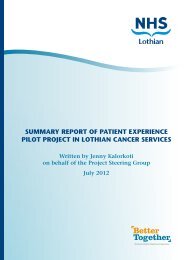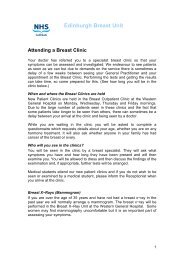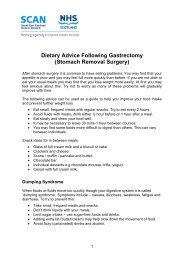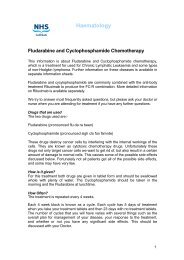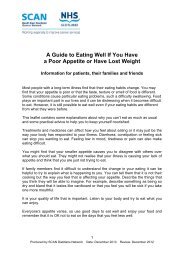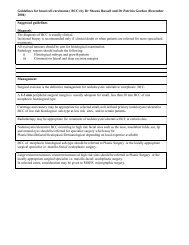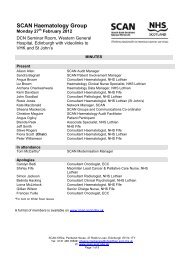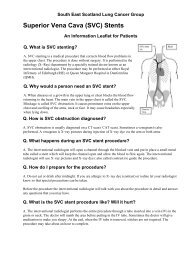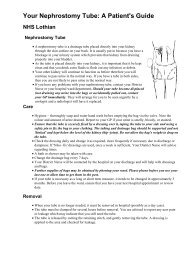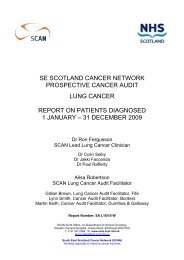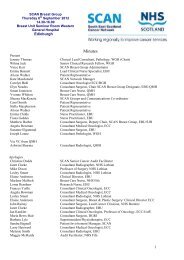Cisplatin and Etoposide chemotherapy in combination with ... - SCAN
Cisplatin and Etoposide chemotherapy in combination with ... - SCAN
Cisplatin and Etoposide chemotherapy in combination with ... - SCAN
Create successful ePaper yourself
Turn your PDF publications into a flip-book with our unique Google optimized e-Paper software.
5 2<br />
Some people also require to be fed temporarily<br />
through a tube as an <strong>in</strong>-patient. Most cases do not<br />
need this <strong>and</strong> we can treat you as an out-patient. The<br />
pa<strong>in</strong> on swallow<strong>in</strong>g can last a few weeks after the end<br />
of radiotherapy. Very occasionally radiotherapy can<br />
cause a long term scarr<strong>in</strong>g of the oesophagus, which<br />
needs to be <strong>in</strong>termittently stretched.<br />
• Inflammation of the lungs (pneumonitis) – this<br />
can occur from 1-3 months after you f<strong>in</strong>ish your<br />
radiotherapy. You might notice that you become more<br />
short of breath <strong>and</strong>/or develop a cough. About 1 <strong>in</strong> 5<br />
people receiv<strong>in</strong>g radical radiotherapy for lung cancer<br />
need a course of steroids for this, about 1 <strong>in</strong> 20 need<br />
oxygen for a time <strong>and</strong> about 1 <strong>in</strong> 100 people can die<br />
from this.<br />
• Long-term scarr<strong>in</strong>g of the lungs – over many<br />
years the radiotherapy can cause fibrosis or scarr<strong>in</strong>g of<br />
the lungs. This is why we check your breath<strong>in</strong>g tests<br />
before we recommend radical radiotherapy. Follow<strong>in</strong>g<br />
radiotherapy you may notice that your breath<strong>in</strong>g<br />
gradually becomes a little worse. This is one of several<br />
reasons why we recommend you stop smok<strong>in</strong>g.<br />
How the treatments are given<br />
The description <strong>in</strong> the table is the general scheme but due to<br />
difficulties <strong>in</strong> co-ord<strong>in</strong>at<strong>in</strong>g the treatment your personal<br />
schedule may not be exactly the same. Your radiotherapy starts<br />
usually starts at the beg<strong>in</strong>n<strong>in</strong>g of your 2nd cycle of<br />
<strong>chemotherapy</strong> <strong>and</strong> cont<strong>in</strong>ues until 1 week after your 3 rd .<br />
2. Nausea <strong>and</strong> vomit<strong>in</strong>g – this can be a common<br />
problem <strong>with</strong> this <strong>chemotherapy</strong>. We will give you antisickness<br />
tablets to take whilst receiv<strong>in</strong>g your<br />
<strong>chemotherapy</strong> <strong>and</strong> for a few days afterwards to try <strong>and</strong><br />
help combat this. It is very important that you dr<strong>in</strong>k<br />
plenty <strong>in</strong> the days follow<strong>in</strong>g your <strong>chemotherapy</strong>. If<br />
you cannot do this you should let us know.<br />
3. Effects on your blood mak<strong>in</strong>g cells – all<br />
<strong>chemotherapy</strong> can have effects on your bone-marrow.<br />
This can make you more prone to:<br />
• Anaemia - you may require blood transfusions<br />
• Bleed<strong>in</strong>g or bruis<strong>in</strong>g - due to fewer platelets<br />
(the cells that make your blood clot). You may<br />
require a platelet transfusion for this.<br />
• Infections – due to a reduction of white blood<br />
cells (<strong>in</strong>fection fight<strong>in</strong>g cells). Infections can<br />
be potentially life threaten<strong>in</strong>g so it is important<br />
to seek medical advice immediately if you feel<br />
unwell.<br />
If your temperature goes above 38°C (100.5°F) or if you<br />
suddenly feel unwell, even <strong>with</strong> a normal temperature,<br />
contact your doctor or the hospital straight away.<br />
Your <strong>chemotherapy</strong> nurse will give you written<br />
<strong>in</strong>formation regard<strong>in</strong>g what to do if these problems<br />
arise.<br />
4. Hair loss – this starts about 3 weeks after the first<br />
dose of <strong>chemotherapy</strong> <strong>and</strong> starts to re-grow about a<br />
month after the last dose. You will be given advice on<br />
obta<strong>in</strong><strong>in</strong>g a wig.<br />
5. Mouth Ulcers – Some patients compla<strong>in</strong> of mouth<br />
ulcers dur<strong>in</strong>g <strong>chemotherapy</strong>. We will give you<br />
mouthwashes to try <strong>and</strong> prevent this. Some patients also<br />
compla<strong>in</strong> of a metallic taste <strong>in</strong> their mouths.



